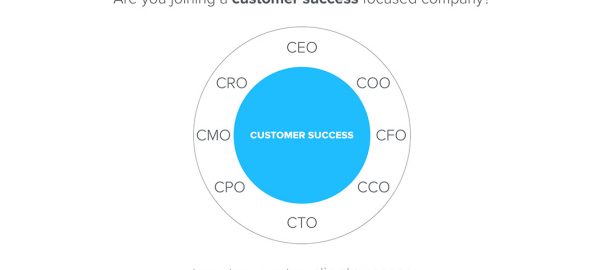Many organizations may believe that they are truly customer-focused and put significant resources in place to make sure customers are successful. After all, building a customer success team requires a hefty budget line to hire the right leader, the right individuals, and even more budget to ensure that they have the right tools and processes across the organization to ensure success. And while many believe they have all the right pieces in place, it can be daunting for a job candidate to ask the right question in order to ensure they’re joining an organization who puts action behind the words “customer success”.
As customer success executives know, building a culture of customer success spans the entire organization, and starts at the top with the executive team. If each and every member of the executive team at an organization isn’t laser focused on the customer, then that’s cause for red flags. But as an outsider looking to join, how can they spot those red flags and either ask deeper questions, or potentially decide against joining?
In this blog post, we’ll examine each top-level executive’s role in building a culture of customer success, as well as the questions that potential job seekers should ask in order to determine when the organization is truly focused on the customer, getting to be customer-focused… or not.
The Chief Executive Officer
First and foremost, if the CEO isn’t focused on customer success, then it’s likely there isn’t a strong culture of customer-first. Without the support of the highest level leadership, then there’s virtually no chance that it’s an important focus in other areas across the business, either. For interviewees that want to ensure they’re joining a customer-focused company, they can look for signs and ask questions during their interview process. Since the CEO is likely doing interviews and authoring articles, it’s easier to pick up on cues than other executives:
- When the CEO is interviewed, do they talk about customers first?
- Does the CEO come across as purely numbers-focused, or do they share customer success stories which allude to revenue growth?
- Does the CEO understand what customer success is at the highest level? Do they have a background at previous companies that reflects a focus on customer success?
The Chief Financial Officer
Of all of the functions across the executive team, identifying whether the CFO is focused on building customer success is usually quite evident. For CFOs, the signs are usually very clear as to whether or not customer success is an important focus and whether or not they believe in it enough to put the dollars behind it. If it is important to them, the CFO assigns dollars and revenue targets to support customer success across the entire organization, from hiring CSMs to customer success leaders to ensuring marketing, product, and even HR are all staffed appropriately. Here are some questions for candidates to consider:
- Is the customer success team fully staffed today?
- Are there customer-focused job openings posted on the website, such as CSM, customer support specialist, customer marketing specialist, and so on?
- When interviewing, is it abundantly clear that there are funds allocated to customers, such as a customer conference or user group meetups funded by the organization?
The Chief Product/Technology Officer
Perhaps the most difficult executive to understand from a distance is the CPO/CTO. The CPO/CTO tends to be focused on the product as their number one priority, and that’s okay. When evaluating whether the product is focused on the customer, it’s important to take a step back and understand that without a working product, no one—especially customers—will be successful. So while the CPO/CTO can seem set apart when it comes to customer success, there are signs to watch for that will give a job candidate confidence that the company’s product is focused on meeting and exceeding customer needs.
- Does the organization have a Customer Advisory Board? Is the CPO/CTO present at the meetings?
- Does the CPO/CTO meeting with customers and attend prospect and customer onsites regularly?
- Is the CPO/CTO involved in sales meetings in order to hear prospect and customer requirements, as well as feedback on the current product?
- Do members of the product team (beyond just the CPO/CTO) attend tradeshows, customer conferences, and field marketing events?
The Chief Revenue/Operations Officer
While the other executive roles may have some gray areas, the CRO/COO is not one of them. It should be abundantly clear as to whether or not the sales leader is focused on the customer, above and beyond just the sales and upsell targets. Of course, the CRO/COO needs to hit the numbers, but a true customer success-driven sales leader knows that relationships are what count, and without solid customer relationships, then the organization will ultimately not succeed. Here are several questions to consider when evaluating whether the revenue portion of the organization is focused on customer success—not just customer sales:
- Is the CRO/COO aligned with the marketing team to ensure customers are invited to events, asked to share success stories, and given the spotlight at conferences?
- Is the CRO/COO more concerned about hitting quotas or attracting the types of customers that will succeed by using the product?
- How much discovery does the average sales rep do with a prospect before presenting a solution?
- Is the customer success team given the same amount of resources (if not more) than the new business sales team?
- How are customer success managers compensated on upsells and renewals?
The Chief Marketing Officer
Behind the CEO, the CMO is usually the most vocal individual in the organization (at least for B2B SaaS companies where marketing is a huge focus area). Therefore, the CMO usually authors articles, participates in interviews, and may even join the CEO on stage from time to time to talk about marketing initiatives. And without fail, the CMO that is customer-focused will talk about customers within the first 5 minutes of every article, interview, or talk. After all, the CMO is truly the customer of the sales leader, so without a strong focus on prospective customers and current customers alike, the marketing team is set to fail. Here are some questions to consider for the CMO and marketing team as a whole:
- Does the CMO discuss customers when writing blog posts or articles?
- Has the marketing team invested in customer success videos and case studies?
- Does the marketing team host customer conferences, field events, and customer user groups? If so, are they well executed and well funded?
- Does the CMO have a strong relationship with the CRO/COO? How do the organizations work together to achieve customer goals?
##
There are many questions to consider when evaluating a new position—especially as of late where customer success is becoming even more important, especially for B2B software companies where customer growth reigns supreme.
While asking the questions above can give job candidates a level of confidence about how customer-focused an organization actually is, it’s important not to run the other direction if a question or two isn’t answered in a picture perfect way. Candidates should look for transparency in their job interviews and even in blog articles and on the company’s website. Any organization that claims to be perfect or that seems to have their customer strategy completely buttoned up is likely hiding something or isn’t being entirely truthful. The fact of the matter is, every organization has areas of strengths and weaknesses. A job candidate should simply seek to understand the answers, and then evaluate from there the level of comfort in joining. The key is to ensure the organization is focused on the customer—even if they haven’t “arrived” at their final destination.
Business & Finance Articles on Business 2 Community(94)
Report Post








